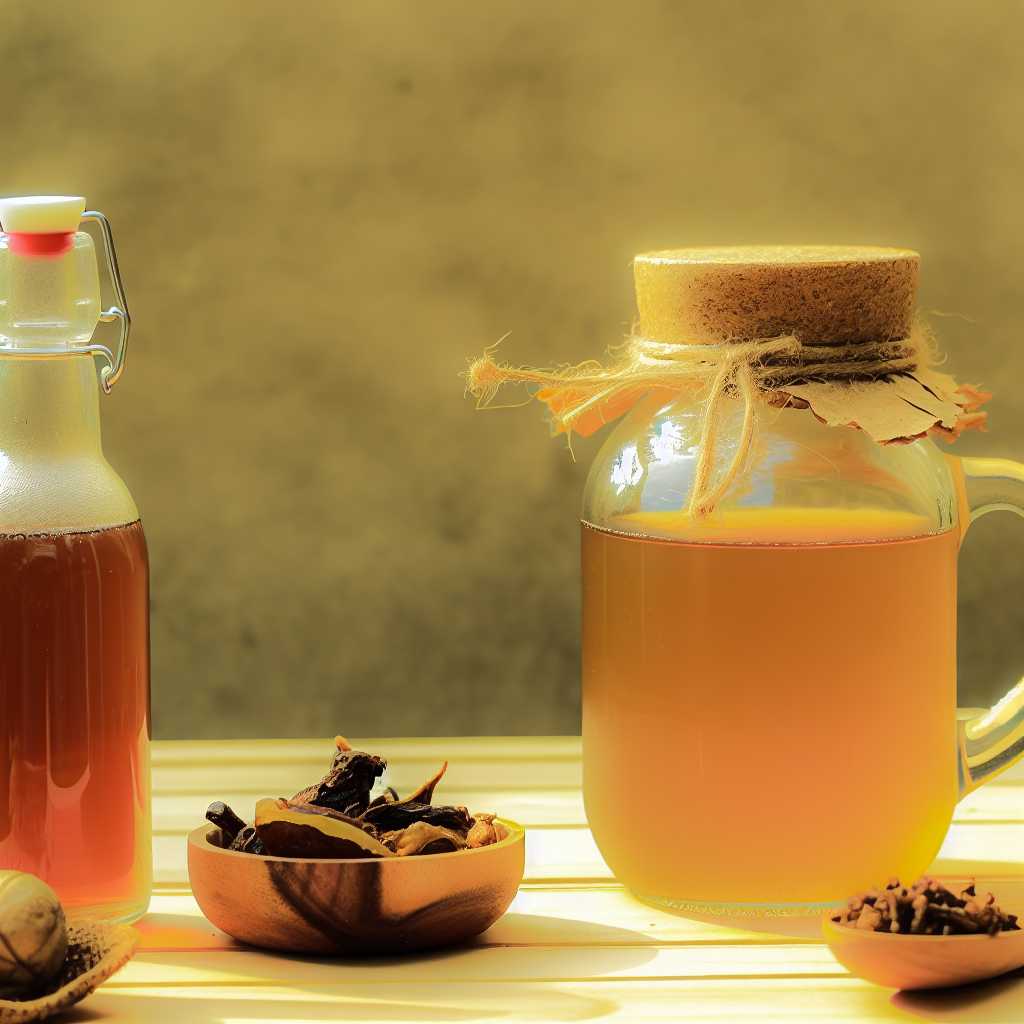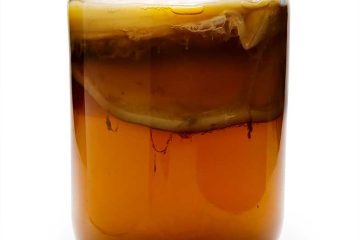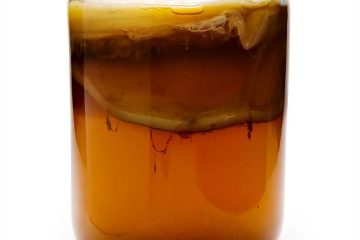Exploring the Key Ingredients of Kombucha Tea

Exploring the Key Ingredients of Kombucha Tea
Kombucha tea is a popular fermented beverage that has gained a loyal following in recent years due to its unique flavor and purported health benefits. Made from a combination of tea, sugar, and a symbiotic culture of bacteria and yeast (SCOBY), kombucha is known for its tangy, slightly sweet taste and fizzy effervescence.
In this article, we will explore the key ingredients of kombucha tea and delve into their individual roles in the fermentation process. By understanding the components that make up this ancient elixir, we can gain a deeper appreciation for its complex flavors and potential health-boosting properties.
Understanding the Key Ingredients of Kombucha Tea
Tea
One of the primary ingredients in kombucha tea is, unsurprisingly, tea. Black tea, green tea, and oolong tea are commonly used in the production of kombucha, each imparting its own distinct flavor profile to the finished beverage. The tea provides the base for the fermentation process, supplying essential nutrients and compounds that nourish the SCOBY and drive the fermentation process.
In addition to its nutritional value, the tea leaves also contribute a range of polyphenols, caffeine, and other bioactive compounds that may have potential health benefits. Some studies suggest that the polyphenols in tea may possess antioxidant, anti-inflammatory, and antimicrobial properties, making kombucha a potentially rich source of these beneficial compounds.
Sugar
Sugar is another key ingredient in kombucha tea, serving as the fuel for the fermentation process. When the SCOBY is introduced to the sweetened tea, the bacteria and yeast begin to metabolize the sugar, breaking it down into various organic acids, carbon dioxide, and trace amounts of alcohol. This transformation results in the tangy, slightly sweet flavor and carbonation that are characteristic of kombucha.
While the idea of intentionally adding sugar to a health-promoting beverage may seem counterintuitive, it’s important to note that the majority of the sugar is consumed by the SCOBY during the fermentation process. As a result, the finished kombucha contains significantly lower levels of sugar than the initial sweetened tea. However, it’s essential for homebrewers and commercial producers alike to monitor the sugar content to ensure that the final product meets their desired specifications.
Symbiotic Culture of Bacteria and Yeast (SCOBY)
The heart and soul of kombucha tea is the symbiotic culture of bacteria and yeast, affectionately known as the SCOBY. This biofilm-like mass is responsible for initiating and guiding the fermentation process, transforming a simple mixture of tea and sugar into a complex and dynamic beverage.
The SCOBY typically consists of cellulose, a fibrous structural component that forms a mat-like layer on the surface of the kombucha. This cellulose matrix provides a home for the diverse community of bacteria and yeast that make up the SCOBY, creating an optimal environment for the fermentation process to take place. As the SCOBY metabolizes the nutrients present in the tea and sugar, it generates a range of organic acids, enzymes, and other byproducts that contribute to the unique flavor and health properties of the finished kombucha.
Similar to the starter culture used in the production of yogurt, sourdough bread, and other fermented foods, the SCOBY is a living ecosystem that requires care and attention to thrive. Homebrewers and commercial producers must ensure that their SCOBY is healthy and robust, as its vitality directly impacts the quality and consistency of the final product.
The Role of Acids and Aromatics in Kombucha
In addition to the primary ingredients of tea, sugar, and SCOBY, kombucha tea contains a diverse array of acids and aromatics that contribute to its complex flavor profile. As the fermentation process unfolds, the bacteria and yeast in the SCOBY produce a variety of organic acids, including acetic acid, lactic acid, gluconic acid, and glucuronic acid, among others. These acids are responsible for the tangy, tart flavor of kombucha, as well as its slightly sour undertones.
In addition to the acids produced during fermentation, the tea leaves used in the brewing process confer their own unique aromatics to the finished beverage. The specific floral, earthy, or grassy notes of the tea are retained and transformed by the fermentation process, adding layers of complexity to the flavor profile of the kombucha.
Potential Health Benefits of Kombucha Tea
While the primary appeal of kombucha lies in its refreshing taste and effervescent nature, many enthusiasts also tout its potential health benefits. Some proponents claim that kombucha may support digestive health, boost the immune system, and provide a source of beneficial probiotics. However, it’s essential to approach these claims with a critical eye and consider them in the context of scientific research and evidence.
Research into the health properties of kombucha is ongoing, and while some studies suggest potential benefits, more robust clinical trials are needed to fully elucidate the impact of kombucha on human health. It’s also important to note that individual responses to fermented foods and beverages can vary, and certain populations, such as those with compromised immune systems or specific medical conditions, should exercise caution when consuming kombucha or other fermented products.
Conclusion
In conclusion, kombucha tea is a unique and complex beverage that brings together a diverse array of ingredients and microorganisms to create a flavorful and potentially beneficial elixir. By understanding the key components of kombucha, including tea, sugar, and the symbiotic culture of bacteria and yeast, we can begin to appreciate the intricate interplay of flavors, aromatics, and health properties that make kombucha so intriguing.
Whether enjoyed for its refreshing taste, potential health benefits, or simply as a fascinating example of the art and science of fermentation, kombucha holds a special place in the world of fermented foods and beverages. As interest in probiotic-rich foods continues to grow, it’s likely that kombucha will remain a beloved and sought-after drink for those seeking a flavorful and potentially health-promoting option.
[elementor-template id=”430″]
[elementor-template id=”433″]




0 Comments